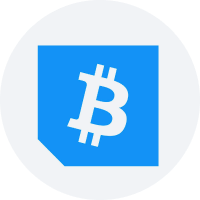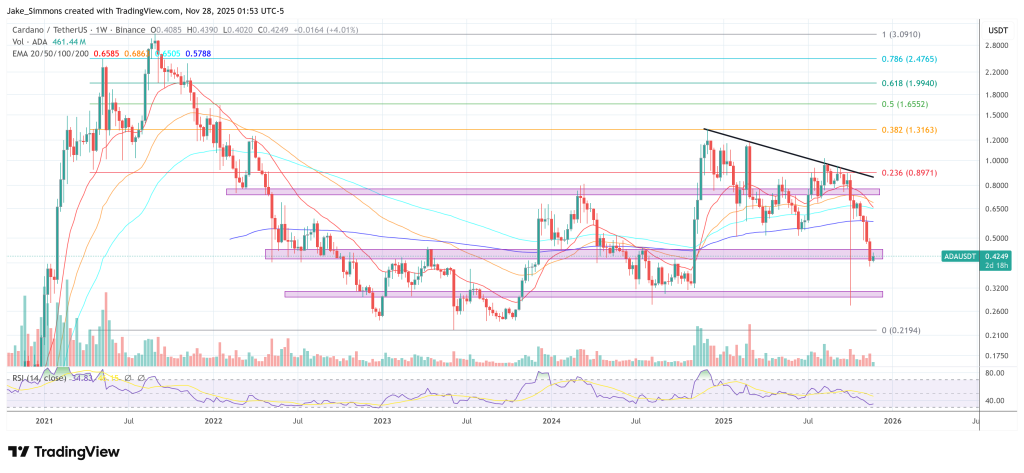Hoskinson Urges Cardano Unity Ahead Of Pivotal 2026 Roadmap

Cardano founder Charles Hoskinson used a Thanksgiving livestream on November 27 to call for a reset of relations between the network’s core institutions and to frame 2026 as a decisive year for the ecosystem.
He acknowledged a bruising year marked by a contentious “social fork” and, more recently, a soft fork and long-chain reorganization. “Everyone has grievances and we all have sins as well, myself included,” he said. “For my part in all these things, I am sorry.”
Cardano Eyes 2026 Reset With Hoskinson’s Call For Cohesion
Hoskinson admitted that his own “rigid and principled” style and public anger over disagreements have sometimes made things worse, and warned that “in disunity and division this ecosystem cannot succeed regardless of philosophical differences.” He pledged to stop relitigating past disputes with the Cardano Foundation and focus instead on “the new governance structure moving forward.”
He tied that reset to a joint governance push by five institutions: IOG, the Cardano Foundation, EMURGO, Intersect and the Midnight Foundation. He credited “Philip [Pon] from EMURGO and Fahmi [Syed] from the Midnight Foundation and Jack [Briggs] from Intersect” for convening talks on “how all five entities […] can work better together for the greater good of the Cardano ecosystem,” and said the community should expect coordinated proposals, including a “critical integrations” budget for missing core infrastructure ahead of 2026.
Hoskinson also rejected characterizations of this week’s soft fork as a systemic failure, calling it “a demonstration of the strengths of Cardano as a whole.” Its Nakamoto-style proof-of-stake and “remarkable protocol engineering,” he argued, allowed the network to “organically recover without significant disruption or loss,” with genesis and infrastructure preserved.
Drawing an analogy to Bitcoin’s history of orphaned blocks, he argued that temporary chain splits are “a feature, not a bug,” because they create “internal resilience” that lets the network “recover to the longest chain over time.” The incident, he said, reminded him that “no matter how big the fork, there is a way for two chains to become one.”
Looking forward, Hoskinson cast 2026 as the key execution window for Cardano’s roadmap. He highlighted Hydra’s emerging DeFi use cases, “amazing innovations like Starstream,” the commercialization of the Midnight ecosystem and the opening of “completely new markets” through Bitcoin DeFi.
Realizing that vision, he said, requires a coordinated effort from “the young new ones like the Midnight Foundation,” groups “with a lot of collaboration but dissonance like Intersect,” infrastructure players such as Pragma and “the old guard” at IOG and the Cardano Foundation, alongside the wider community.
The speech also drew a sharper ideological line between what he described as two philosophies that will shape crypto over the next five years. One, in his telling, seeks to “rebuild Wall Street, make it a little faster, better, and cheaper” while preserving the same control structures and middlemen. The other, rooted in the cypherpunk tradition and Satoshi Nakamoto’s design, insists that “no entity should be so powerful that they get to decide your freedom of association, commerce and expression.”
Hoskinson positioned Cardano, Midnight and Bitcoin within the latter camp. “We’re the good guys,” he said. “Every day we wake up and we fight for every person to have a seat at the table […] they have a right to be there by the fact that they are human.” If the ecosystem can translate that ethos into unified governance and shared infrastructure, he argued, “this time next year, we will be 10 times stronger than we are today.”
Notably, the livestream came after the first joint governance proposal from Intersect, IOG, Emurgo, Cardano Foundation and the Midnight Foundation. Intersect wrote via X: “The Critical Integrations Budget – now on-chain – reflects several weeks of collaboration among the core entities, with last week’s mainnet incident highlighting the strength of that coordination. The Budget Info Action is now available for DReps and the six Constitutional Committee members to consider and vote on.”
At press time, ADA traded at $0.42.








